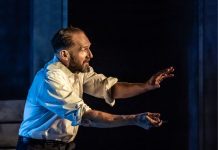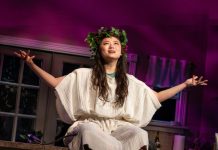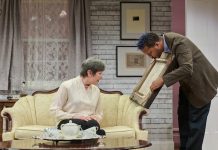Ah, l’amour! In what could be called a perfect DC description of, and introduction for, a perfect Valentine’s Day concert, Russian Chamber Art Society president Mary Kruger welcomed the sizable and enthusiastic audience with the observation that the music we were about to hear—a departure from the RCAS’s usual, strictly classical fare, featuring a celebrated crossover vocalist as at home in rock and pop as he is in Puccini—would be “the perfect emotional release after weeks of government stand-offs and shutdown.” And the Kazakh-American tenor Timur, deftly accompanied by Anna Kusner on guitar and Genadi Zagor on piano, both of whom matched him in skill and passion, delivered a full bouquet.
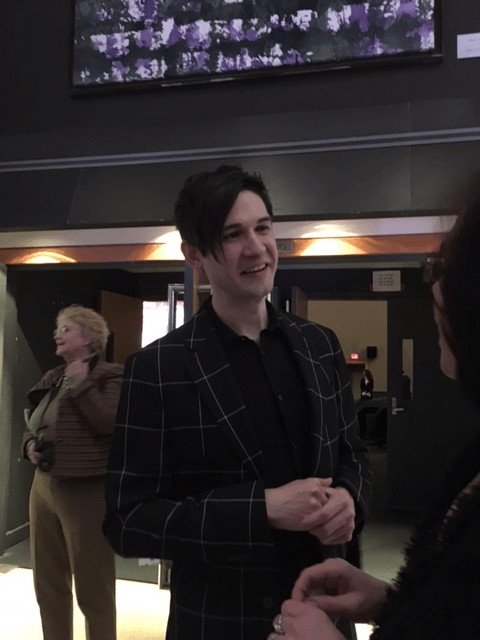
Designed as a tribute to four “charismatic Russian performers . . . legendary entertainers, who captivated opera, concert hall and cabaret audiences throughout the 20th century,” the program featured rarely heard romantic selections from the repertoire of Sergei Lemeshev, Ivan Kozlovsky, Alexander Vertinsky, and Vadim Kozin. Taking a page from their book both literally and figuratively, Timur served as both singer and showman (as would Kusner and Zagor for their respective solos), introducing each song with informative and engaging patter as he set the stage for the stories he (as they) would tell.
In addition to Vertinsky and Kozin, each represented by four songs, two of which each of them wrote as well as performed, the composers ranged from the familiar (Glinka) to the esoteric (Varlamov, Blanter, Obuhov, Sidorov) to the unknown (Anonymous) and offered an affecting, and at times rousing, journey through the dizzying ebb and flow of modes and moods of romantic love.
The three musicians made a seamless team, each member’s gifts and skills clearly evident, but always in service to the whole. Songs such as Mikhail Glinka’s “My Blood Is Boiling with Desire” (lyrics by Pushkin) and Alexander Varlamov’s “Do Not Wake Her at Dawn” and “Do Not Kiss Me” were accompanied by Kusner’s classically meticulous yet limpid leaps and plucks and warm baritone sound and Zagor’s cool mellowness and delicately rippling or impassioned keyboard-crashing accelerandos, growing inexorably in intensity in tandem with Timur, who rendered the melodic line with searing fervor or lilting grace.
Others, such as Vertinsky’s “Days Are Running Fast,” a practical, wryly melancholic conversation between disenchanted lovers, were spirited and declamatory—this one in particular so irresistibly entertaining, a portion of the audience erupted in cheers at the end. For this number, the tenor donned a wham-glam red suit and tie (set off by a sparkling black-and-silver vest) to honor not just the day but the composer, who would powder and paint his face, dress as a harlequin (the ‘Russian Pierrot’) and present dramatic narratives in song.
Timur did his share of that himself, offering humorous stories with the expert timing and gestural ease of the nightclub and TV variety show comics of yore. (Was at a shooting range when nobody was hitting anything, no matter how carefully or how many times they aimed and fired. Scurvy-looking guy walks in, fumbles awkwardly for what seems like forever with an ill-fitting rifle, exacerbating the exasperation factor of the regulars, haphazardly pulls the trigger—and scores a bullseye.) In a quick turnabout, Timur’s next focus was on the very personal story of “The Little Ballerina,” with whom Vertinsky fell in love and who, according to his writings, took everything he gave her and demanded more. Here, Timur exaggeratedly but expertly mimed the ballerina’s mincing steps, pliés, and sautés arabesques, drawing appreciative chuckles from the audience.
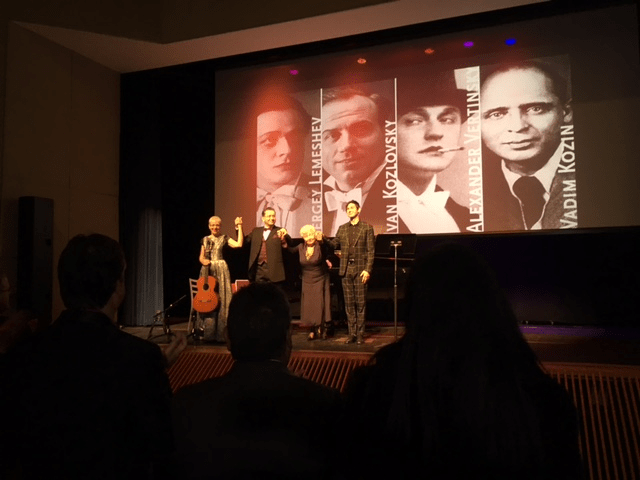
Given that Stalin was an inescapable part of the life (and livelihood) of any Russian of the time, and Ivan Kozlovsky was a particular favorite of the dictator’s, the program included one of the singer’s standards that was also a personal favorite of Stalin’s: “The White Steppe,” a Russian folk song that, like several of the others, would have felt right at home on the soundtrack of a thirties Hollywood film. (Not surprising, with many of their composers Europeans who found refuge here from their war-torn native lands.) Timur executed it with aplomb. In “I Have Met You,” whose composer is unknown, his dynamic range, musical and emotional, was displayed in all its glory, the concluding high note a bursting, ravishing, coruscating fortissimo diminishing to a barely audible, but angelically pure, insistently, almost impossibly held, breathtakingly sustained pianissimo.
Genadi Zagor’s improvisations on Fritz Kreisler’s “Liebesleid” (love’s sorrow, a nod to the program’s title) demanded a more intellectually grounded concentration. Stylistically varied, tonically and melodically inventive and masterfully executed, his quicksilver modulations and volume changes (from roaring orchestral surges to silvery, shivery, rippling icicles) had the original either hanging on for dear life, or electrifyingly rejuvenated.
Timur, now in a dark gray suit, its fabric a landscape of large adjacent squares with borders of white thread, noted that the final composer-performer, Vadim Kozin, was adored even when he was variously imprisoned and exiled by Stalin. (Kozin, who lived to be 91, told an interviewer that he was once briefly released when Winston Churchill, unaware of the circumstances, asked his Yalta co-negotiator to have Kozin flown in to perform during a break in the talks.) Timur’s rendition of A. Obuhov’s “The Garden Gate” was gentle, with passages of cabaret-style crooning, while “Autumn,” written by Kozin, though melancholy, had a firm, bouncy, very “Russian” beat, which all three musicians satisfyingly dug into with gusto.
As they did with the final number, V. Sidorov’s rousing “Friendship,” along with many audience members, who clapped firmly and happily in time to the beat. A gratifying ending to a satisfying concert. Za lyubov!
Sorrow of Love, Joy of Love: Love Songs of the Great Entertainers was presented by the Russian Chamber Art Society on Sunday, February 8, 2019, at the Embassy of France – 4101 Reservoir Road, in Washington, DC. For more information, go online.


